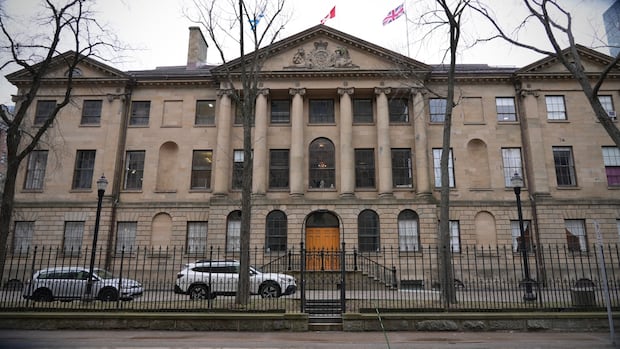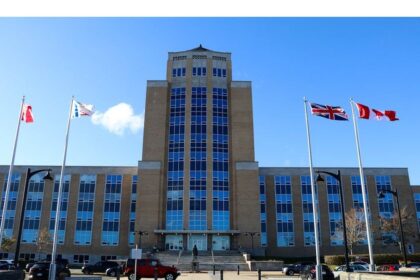Nova Scotia·AnalysisEach of the three main parties face challenges of their own as MLAs return to Province House on Tuesday for the fall sitting of the legislature.The deficit, housing and power rates among issues sure to come upMichael Gorman · CBC News · Posted: Sep 23, 2025 5:00 AM EDT | Last Updated: 3 hours agoMLAs return to Province House on Tuesday for the start of the fall sitting. (CBC / Radio-Canada)As MLAs return to Province House on Tuesday, Premier Tim Houston and his Progressive Conservative government face a slew of challenges.The cost of housing and affordability continue to be a stubborn problem where measurable progress has been slow. Halifax Regional Municipality is dealing with gridlock that seems to get worse with each week, and the health-care system — despite the best efforts of the PCs — faces as many demands as ever.Meanwhile, the government is facing major revenue concerns as the flatlining of population growth and Chinese tariffs on seafood exert big impacts on the books.Call it the billion-dollar question facing the Progressive Conservatives, given Monday’s fiscal update from Finance Minister John Lohr that showed the provincial deficit is now on pace to top $1.2 billion.And yet, it’s a pretty good time to be in government in Nova Scotia these days.NDP Leader Claudia Chender has signalled that affordability will continue to be a big part of what her party wants to discuss at Province House. (Dan Jardine/CBC)That’s because, despite their best efforts, the province’s two opposition parties have made little progress cutting into Houston’s popularity or taking advantage of areas where he and his government could be vulnerable.Since forming the Official Opposition about a year ago, NDP Leader Claudia Chender has toured the province, trying to drum up support for her party, but to date they’ve struggled to find an issue that’s resonated with the public in a way to boost the party’s fortunes.Indeed, the NDP is the party that traditionally has advocated for things such as more affordable housing and better wages, yet with announcements of their own, the Progressive Conservatives have been able to point to efforts such as plans to build new public housing, partner with non-profits and increase the minimum wage, even if large gaps remain when it comes to affordability.More recently, however, the New Democrats have shown signs that they believe yet another round of rate increases proposed by Nova Scotia Power could be a path toward knocking the government back a few steps.Chender talked last week about a proposal calling on the government to provide a 10 per cent rebate on power bills for a year, and legislation to that effect will come during this sitting.The Liberals, meanwhile, could not be much further from forming government.Interim Liberal Leader Derek Mombourquette and his two-person caucus will work to hold the government to account while his party begins to work to find a new permanent leader. (Dan Jardine/CBC)While the two-member caucus has proved able to punch above its weight in the House and on committees, the party is also embarking on its third leadership race since former premier Stephen McNeil announced he was retiring in 2020.With Sean Fraser cancelling his own retirement plans to reoffer in the last federal election and subsequently being named justice minister after a successful re-election, there is no obvious front-runner to vie for the provincial party’s top job.Regardless of how well Liberal MLAs Iain Rankin and Derek Mombourquette perform at Province House, their party will face the dual focus of trying to hold the government to account while working to rebuild their own organization.There was subdued optimism for that work during the party’s annual general meeting in Halifax last weekend, but it was also clear how much work lies ahead for the group as it gathered in a hotel ballroom a fair bit smaller than what the party would have booked at the height of McNeil’s popularity.Houston, like other recent premiers, is known to prefer a shorter legislative sitting in order to reduce the amount of time he’s subject to daily questioning from reporters and the number of question periods he and other cabinet ministers must face.Nova Scotia Premier Tim Houston has faced few headwinds from opposition MLAs since he first formed government in 2021. The threat of a record-setting deficit could create new challenges for the Progressive Conservatives. (Pat Callaghan/CBC)It’s easier to make mistakes and work through them when everyone doesn’t know where to find you from one day to the next.But beyond whatever potential tripwires await the Progressive Conservatives in the people’s House, the ballooning deficit sets the table for challenges that could follow them beyond the walls of the historic building in downtown Halifax.Lohr gave no indication on Monday that austerity is something he and the government are considering at this time. But if the numbers do not improve in the coming months, something will have to give.One of the things that’s helped Houston’s popularity since he and his team first formed government in 2021 is that, so far, he’s not really had to say no very often.The requests don’t endThe revenue that’s come from record population growth and corresponding development has meant lots of extra money for grants, programs, new buildings and wage settlements that had the added bonus of buying the government labour peace with the major unions, even if the latter has helped drive up the bottom line.Perhaps enough has been done in the last four years that there could be fewer asks in the future, although that seems unlikely. There’s always going to be a legion hall that needs a new roof or a community that needs a new school or a road in need of a fresh paving job, especially in a caucus with a record 43 members.In the absence of a change in fortunes, however, Houston and the Progressive Conservatives may have to start saying no, and that will bring with it day-to-day difficulties inherent with governing and the opportunity for the opposition parties to start to claw back some ground from a government they so badly trail.ABOUT THE AUTHORMichael Gorman covers the Nova Scotia legislature for CBC, with additional focuses on health care and rural communities. Contact him with story ideas at michael.gorman@cbc.ca
Nova Scotia’s 3 main parties all face challenges as MLAs return to Province House











